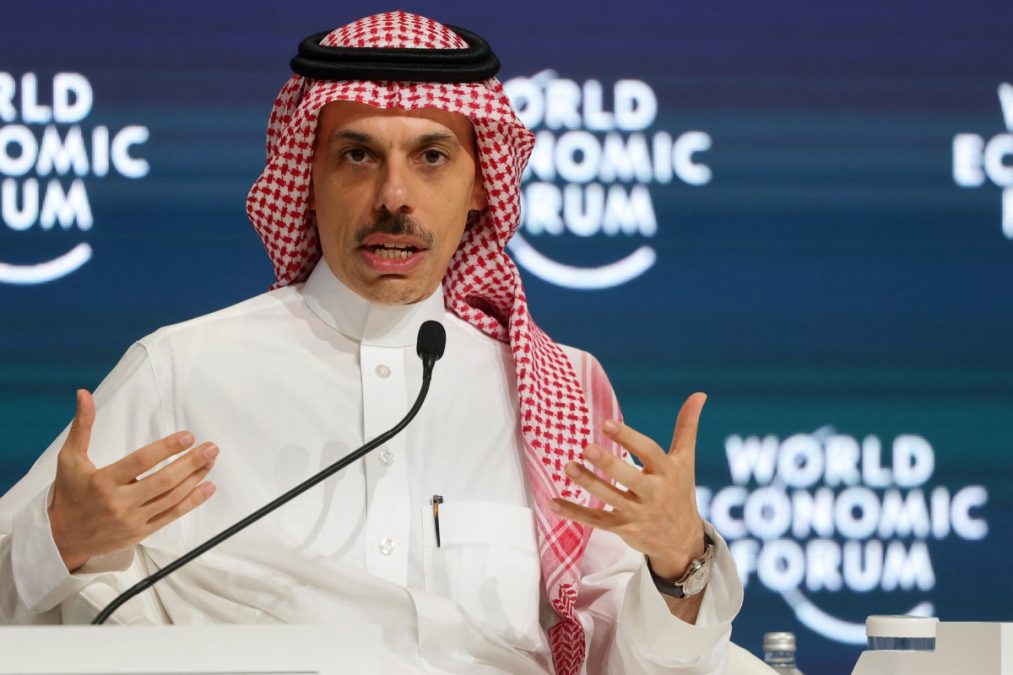Riyadh, Saudi Arabia – The World Economic Forum in Saudi Arabia represents a crucial milestone for the Kingdom, offering an invaluable chance for businesses in the wider region, says Gabriel Chahine, the Middle East Lead for AlixPartners.
In an exclusive Q&A with TRENDS on the sidelines of the event, Chahine discussed how CEOs in the Middle East can respond to global economic factors, the role of AI and data in driving innovation and growth, and strategies for businesses to mitigate risks amidst ongoing geopolitical crises.
Excerpts:
Q. Could you share your thoughts on the significance of the World Economic Forum’s inaugural session in Riyadh? How do you believe it will impact businesses in Saudi Arabia and the broader region?
A. The World Economic Forum’s inaugural session in Riyadh aligns with Saudi Arabia’s growing influence and its commitment to global collaboration – key aspects of Vision 2030. It marks a significant milestone for the Kingdom and presents a valuable opportunity for businesses in the broader region by fostering a climate of increased investment opportunities in sectors like technology and AI, while also promoting collaboration and knowledge sharing between regional and global players.
This, combined with insights gained from discussions on critical issues like infrastructure and clean energy, empowers businesses to adapt their strategies, navigate the evolving landscape, and ultimately contribute to a sustainable future for the region.
Q. As representatives of AlixPartners, what insights can you offer on the current economic environment in the Middle East? How should CEOs in the region respond to both regional and global economic factors, such as inflationary pressures and geopolitical crises?
A. The outlook for Middle Eastern economies remains positive – we’ve seen data from the IMF show robust non-oil growth projected at 3.6% and an overall GDP growth forecast of 2.4% this year.
This optimism stems from the region’s efforts toward economic diversification. Many countries are reducing their reliance on oil and gas by investing in renewable energy, tourism, and technology sectors. These initiatives contribute to a more resilient economy. Moreover, these governments are enacting reforms to enhance the business environment, attracting foreign investment, and fostering private sector expansion.

However, the region faces disruptions due to global and regional headwinds, including inflation and geopolitical crises. To navigate this complex environment, CEOs in the Middle East must adopt a multifaceted approach. They need to invest in robust scenario planning and develop strategies that account for both the impact of rising oil prices and the challenges stemming from regional instability and global inflation.
Operational efficiency is paramount in building business resilience, particularly in the face of inflationary pressures. CEOs should prioritize cost optimization and embrace digital transformation for long-term success. Digitalization enhances resilience and future-proofs businesses. CEOs should invest in technologies that enhance agility, elevate customer experience, and unlock new revenue streams.
Furthermore, reevaluating supply chains is crucial amidst global disruptions. CEOs should explore options such as near-shoring or multi-sourcing strategies to mitigate risks and ensure uninterrupted business operations.
Most importantly, effective communication and fostering a culture of agility are cornerstones of navigating disruption. CEOs who maintain transparent communication with employees and stakeholders, and who cultivate a workforce that can adapt to changing circumstances, will be best positioned to thrive in this dynamic environment.
Q. With advancements in AI and the increasing value of data, how do you see businesses in the Middle East leveraging these technologies to drive innovation and growth?
A. The Middle East is uniquely positioned to capitalize on the transformative power of Artificial Intelligence (AI) and data analytics. With an estimated US$320 billion in potential added value by 2030, the region is experiencing a surge in national AI strategies and initiatives, recognizing AI’s critical role in economic diversification and growth.
This focus is evident at both national and business levels. Various government visions in this region are aggressively pursuing AI and data-driven futures, aiming to transform their economies and societies. Saudi Arabia’s Vision 2030 is particularly ambitious, aiming for global leadership in AI by 2030.
Saudi Arabia’s US$20 billion investment pledge to establish 300 AI startups by 2030 exemplifies the region’s commitment to fostering innovation. Similarly, findings from our AlixPartners Disruption Index 2024 paint a clear picture: AI and automation are identified as the primary disruptive forces by a staggering 87% of businesses in the MENA region, compared to just 46% globally. This is further underscored by the fact that 64% of Middle Eastern companies plan to prioritize investments in digital transformation to ensure future growth.
Furthermore, our research indicates a strong emphasis on process automation, with 50% of CEOs in the region prioritizing it as a key technique for success in the coming year – double the global average. This focus highlights the region’s proactive approach towards leveraging technology for transformation and maximizing the value of data.
By embracing AI and data-driven strategies, businesses in the Middle East have the potential to unlock significant growth opportunities and solidify their position as innovation leaders on the global stage.
Q. In your opinion, what are some of the key challenges facing CEOs in the Middle East today, and how can they effectively address them to ensure sustainable growth and success?
A. CEOs in the Middle East are navigating a dynamic and rapidly evolving landscape. A key challenge they face is the need to adapt their businesses to the accelerating pace of change. Our AlixPartners Disruption Index 2024 highlights this concern, with 67% of regional leaders expressing anxieties about their company’s agility. This is translating into action, with over 60% actively transforming their business models. This focus on transformation is further underscored by the region’s emphasis on digitalization.
AI and automation are identified as the primary disruptive forces by a staggering 87% of businesses in the MENA region, compared to just 46% globally, according to our Disruption Index. Reflecting this, 64% of Middle Eastern companies plan to prioritize investments in digital transformation to drive future growth. Furthermore, a strong emphasis is being placed on process automation, with 50% of CEOs prioritizing it as a key strategy for success. This is double the global average, highlighting the region’s commitment to leveraging technology for transformation.
Geopolitical tensions and global events can disrupt traditional supply chains. CEOs need to build resilience by diversifying their supplier base, exploring nearshoring options, and leveraging data analytics to gain real-time insights into potential disruptions.
Workforce skills gaps pose a major hurdle, with 85% of CEOs in our survey concerned about their employees’ skills becoming obsolete. Additionally, fostering a culture of change within the workforce presents another obstacle, with 80% of CEOs expressing this concern compared to the global average of 55%.
Despite these challenges, there are positive developments. Visa reforms are making it easier to attract and retain skilled talent. Additionally, CEOs are taking proactive steps to navigate disruption, with 80% investing in scenario planning and action plans. Notably, 70% are prioritizing revenue growth over short-term profitability, indicating a long-term perspective on building core business strength.
By embracing digital transformation, addressing workforce challenges, and adopting a strategic approach to growth, CEOs in the Middle East can effectively navigate these complexities and ensure sustainable success for their businesses.
Q. Amidst global and regional disruptions, what opportunities do you believe exist for businesses in the Middle East? How can companies capitalize on these opportunities while navigating uncertainties?
A. Disruptive forces, both global and regional, pose challenges for businesses in the Middle East. However, AlixPartners’ Disruption Index 2024 and ongoing research reveal exciting opportunities for companies willing to adapt and innovate. The region’s high AI adoption rate, for example, presents a chance to become a global leader in AI-driven innovation. Similarly, businesses prioritizing digital transformation can unlock new revenue streams and streamline operations. Visa reforms and a focus on talent development create the potential to attract and retain a skilled workforce, crucial for the digital age. Additionally, the region’s strategic location offers an opportunity to become a trade and logistics hub, lessening dependence on individual markets.
Capitalizing on these opportunities requires navigating uncertainties. Businesses can thrive by embracing agility, developing rapid decision-making processes, and scenario planning to adapt to changing circumstances. Investing in AI, automation, and data analytics through digital transformation enhances efficiency and creates new value propositions. Upskilling the workforce through training programs and fostering a culture of continuous learning bridges the skills gap. Building regional partnerships creates a robust and resilient supply chain network, reducing reliance on single sources. Finally, focusing on long-term growth prioritizes building core business strength for sustainable success.
Q. With the ongoing regional geopolitical crisis, what strategies do you recommend for businesses to mitigate risks and maintain resilience in their operations?
A. The ongoing geopolitical crisis in the region presents a complex and challenging environment for businesses. Our thoughts are first and foremost with those impacted by this tragic situation.
However, even in times of uncertainty, businesses can take proactive steps to mitigate risks and maintain operational resilience. Here at AlixPartners, we believe leveraging local expertise and a deep understanding of the region will be critical for navigating these immediate challenges.
Our extensive experience in the Middle East allows us to partner with companies and develop targeted strategies. This includes building resilience through supply chain diversification well before a crisis hits. For example, we have a proven track record of helping clients redesign distribution networks to reduce reliance on single sources or shipping routes.
By prioritizing local relationships, regional knowledge, and robust risk mitigation strategies, businesses in the Middle East businesses can emerge stronger and more adaptable in the face of ongoing disruptions.

